The Bernese Mountain Dog Poodle mix is a unique and intriguing breed that combines the gentle giant nature of the Bernese Mountain Dog with the intelligence and trainability of the Poodle.
This crossbreed typically weighs between 60-80 pounds and stands between 20-24 inches tall at the shoulder, making them a medium to large-sized dog.
Their coats can vary from curly to wavy to straight, often requiring regular grooming to prevent matting and tangling.
Temperament and Personality
Bernedoodles are intelligent dogs that can become bored easily with repetitive activities. They need at least sixty minutes of exercise and mental stimulation each day to thrive.
Their hybrid nature makes it difficult to predict their temperament, but they often inherit the best traits from their parent breeds. Bernese Mountain Dogs can be strong-willed and stubborn, while Poodles may exhibit hyperactivity, anxiety, and excessive barking.
Bernedoodles are generally good with children and other dogs when socialized properly. However, some individuals may inherit the Bernese's apprehension around strangers, making early socialization crucial.
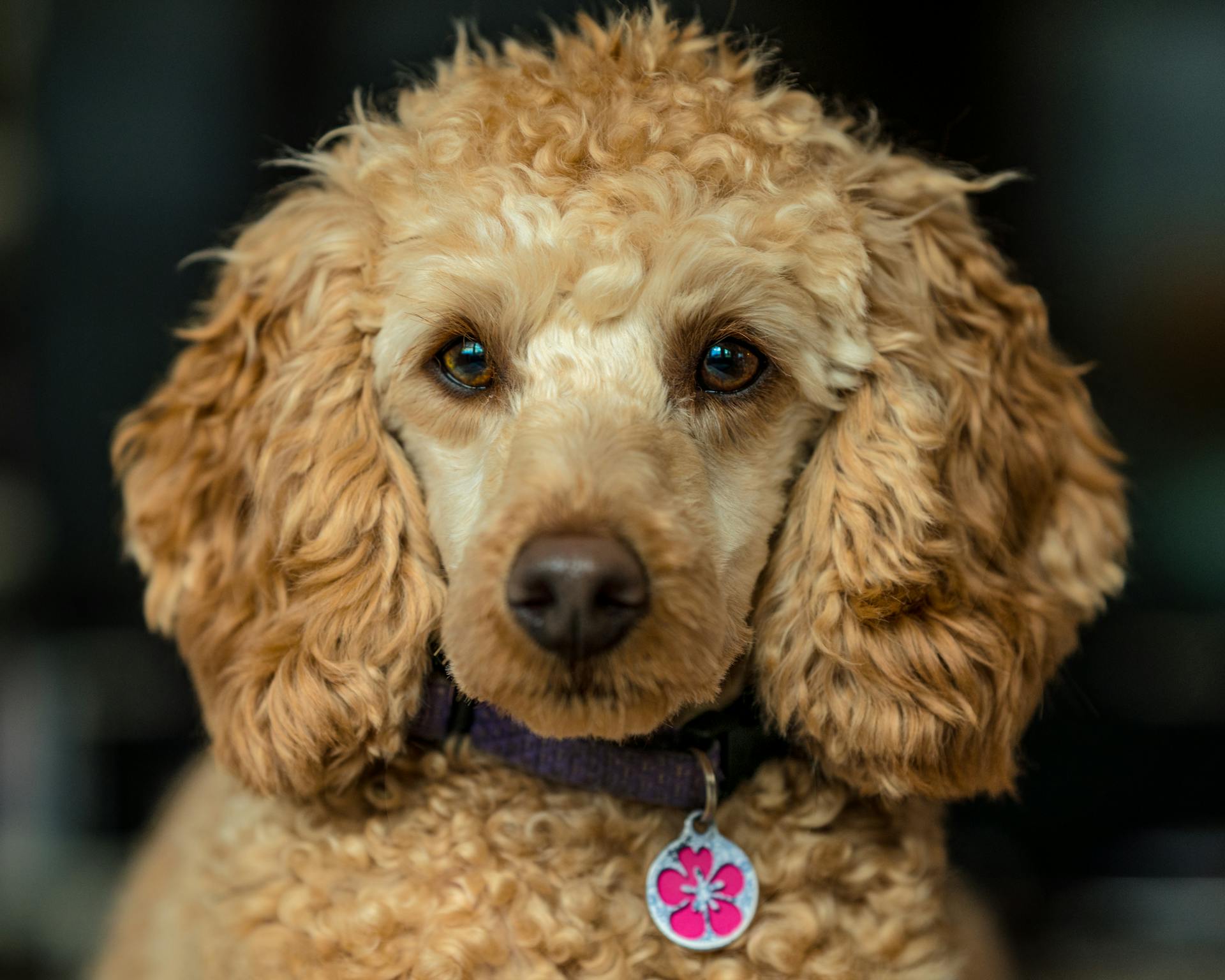
To address potential behavioral issues, it's essential to introduce positive training sessions in puppyhood. This can help prevent problems like hyperactivity and excessive barking from growing into bigger issues.
Bernedoodles are loyal and loving companions that crave attention and affection from their humans. They do best in homes where they receive regular interaction and exercise.
Tiny and Miniature Bernedoodles may be more suited for apartment living, while Standard Bernedoodles require more space to move around. All Bernedoodles need at least a daily walk to burn off energy and stay happy and healthy.
With the right training and socialization, Bernedoodles can become wonderful lifelong companions for families and individuals alike. They're intelligent, playful, and loving dogs that bring joy and affection into our lives.
Here's an interesting read: Bernese Mountain Dog Health
Care and Feeding
A Bernese Mountain Dog Poodle mix is a relatively low-maintenance breed when it comes to space, but they do require regular exercise and mental stimulation.
They thrive on human interaction, so the less time spent alone, the better. In fact, they can learn bad habits just as easily as good ones if not properly trained.
To keep your Bernese Mountain Dog Poodle mix well-behaved, early socialization and exposure to other dogs and humans is crucial. Finding a reputable dog breeder who prioritizes health, socialization, and support is also essential.
Size

The Tiny Bernedoodle stands at 12 to 17 inches tall at the shoulder, and weighs about 10 to 24 pounds.
Males are generally larger than females, which is something to keep in mind when considering a new pet.
Bernedoodles come in three sizes: tiny, miniature, and standard. This variety can affect exercise needs and living arrangements.
The Miniature Bernedoodle stands at 18 to 22 inches tall and weighs 25 to 49 pounds.
Standard Bernedoodles stand at 23 to 29 inches tall and weigh 70 to 90 pounds.
Recommended read: Bernese Mountain Dog Standard
Nutrition and Feeding
A Bernedoodle's diet needs a balance of minerals and vitamins that support their joint and cartilage needs.
Feeding your Bernedoodle smaller, more frequent meals can help minimize the risk of bloating and stomach problems.
Standard Bernedoodles may be voracious eaters, so it's essential to monitor their food intake and weight while providing plenty of physical activity.
Your dog's diet should have a constant supply of fresh water at all times.
You'll need to conduct regular body condition scores to ensure your Bernedoodle stays in ideal shape.
Feed them at least twice daily, following the feeding guidelines for their particular food.
Expand your knowledge: Bernese Mountain Dog Puppy Feeding Chart
Health and Grooming
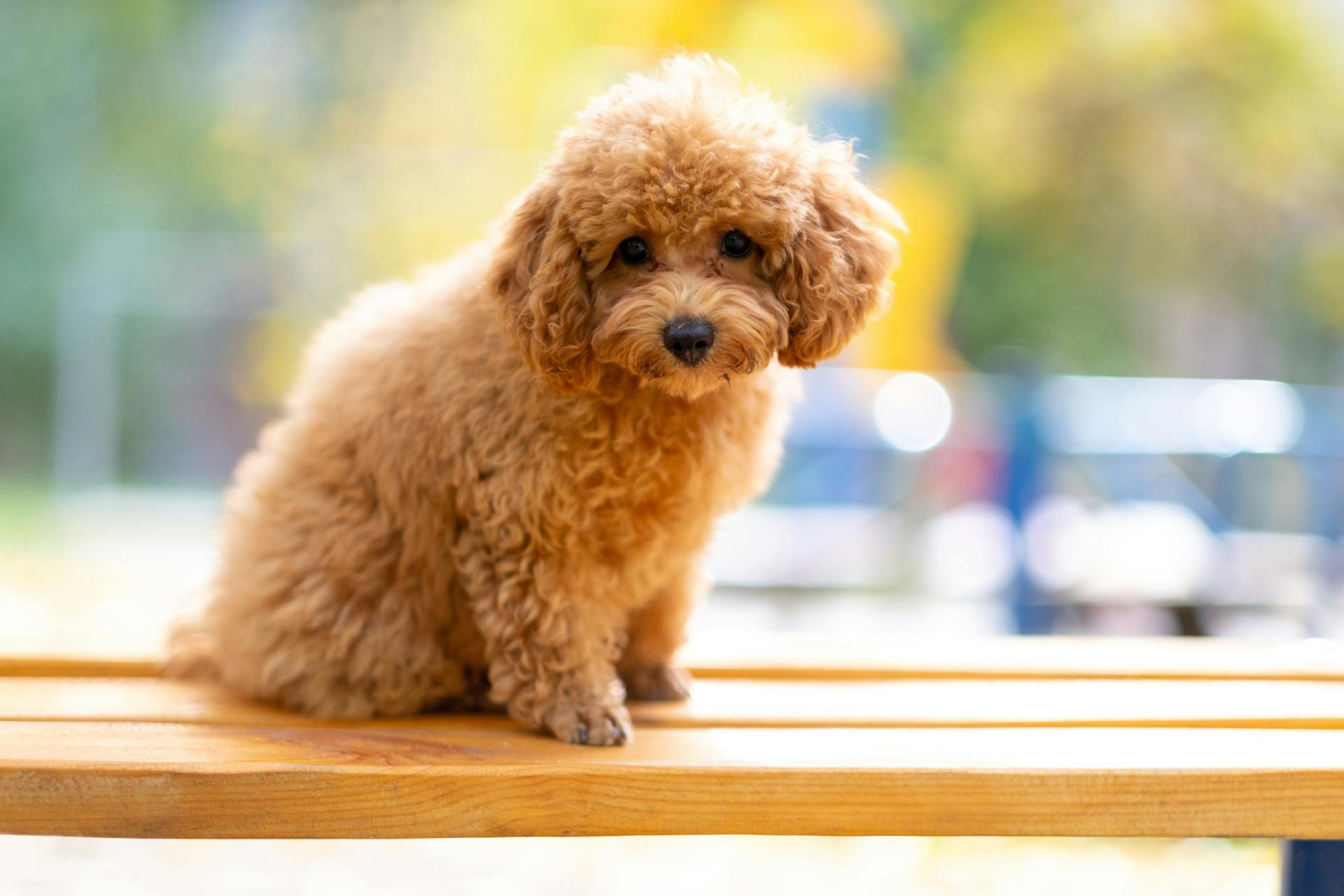
The Bernese Mountain Dog Poodle mix is a generally healthy breed with a lifespan of 12-18 years. They may be prone to some health issues inherited from their parent breeds.
Hip dysplasia and elbow dysplasia are potential concerns, as well as progressive retinal atrophy (PRA), which can lead to blindness. Von Willebrand's disease is another genetic bleeding disorder that can affect this mix.
Grooming is crucial for the Bernese Mountain Dog Poodle mix, especially when it comes to preventing matting and tangling of their curly coat. They require regular brushing, ideally daily, to keep their coat healthy and prevent hot spots from forming.
Their thick coats also make them more susceptible to skin issues like allergies and excessive licking or chewing, which can lead to hot spots. Regular grooming sessions can help identify any potential skin problems early on.
Here are some common health issues that may affect the Bernese Mountain Dog Poodle mix:
- Hip Dysplasia: An inherited condition where the hip joint doesn’t develop properly.
- Elbow Dysplasia: A similar condition affecting the elbow joints.
- Progressive Retinal Atrophy (PRA): A group of genetic diseases that cause the retina to deteriorate over time.
- Von Willebrand’s Disease: A genetic bleeding disorder caused by a deficiency in clotting factor.
By being aware of these potential health issues and maintaining regular grooming sessions, you can help keep your Bernese Mountain Dog Poodle mix happy and healthy.
Grooming
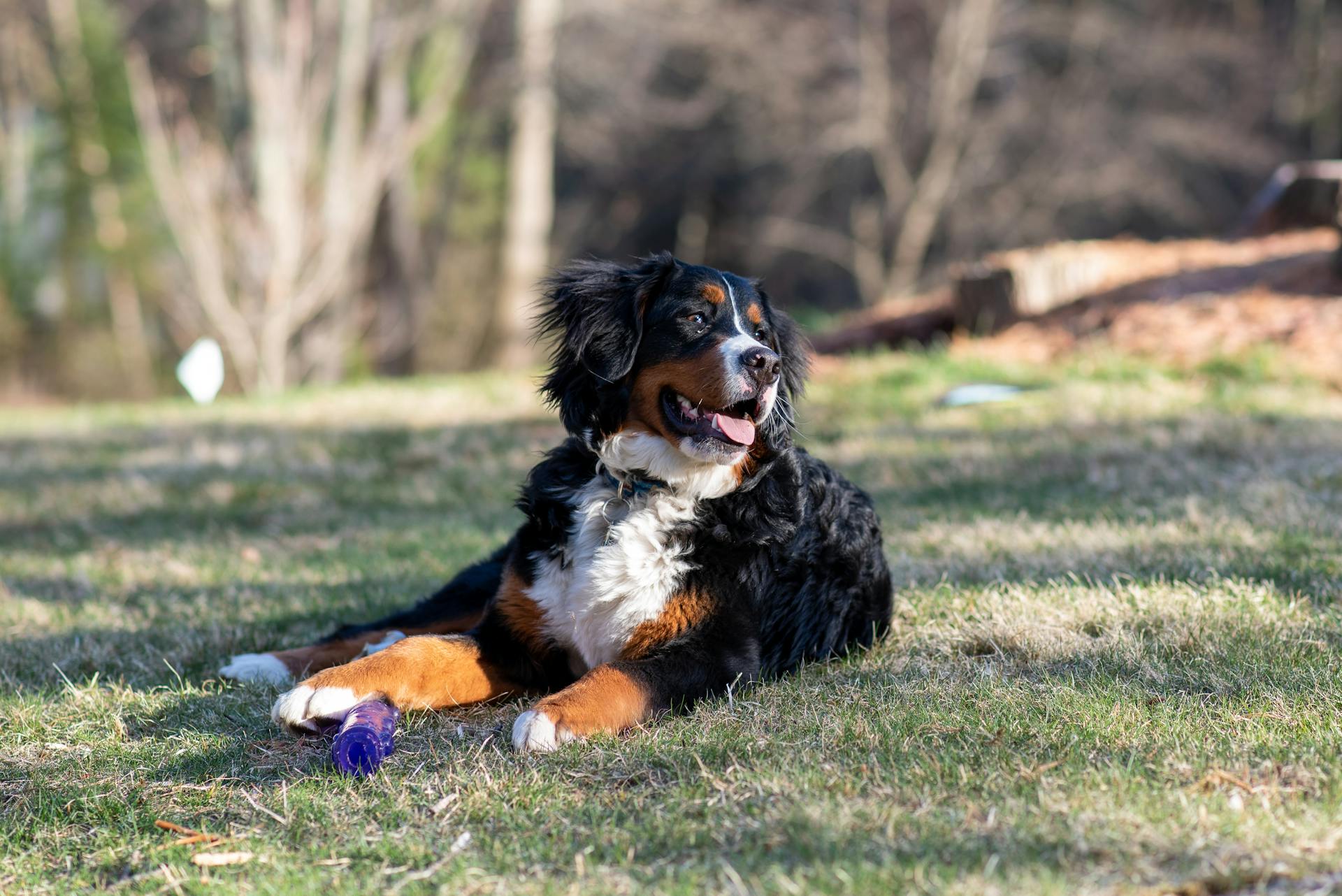
Grooming is an essential part of Bernedoodle care. Brush your Bernedoodle at least twice a week to prevent tangled mats from forming.
Their curly coats require more frequent brushing than straighter coats, which shed more and are less hypoallergenic. This means you'll need to brush your Bernedoodle daily if they have a very curly coat.
The thickness of their coat helps this breed thrive in cool temperatures while providing them protection from the heat of summer months. Regular grooming will also help prevent matting.
Their coats must be trimmed every few months, depending on how quickly it grows. This is especially important for curly-coated Bernedoodles that are prone to matting.
Grooming your Bernedoodle can become a bonding experience if you make it fun and engaging. Many owners find that their Bernedoodles love the attention and affection they receive during grooming sessions.
If this caught your attention, see: Bernese Mountain Dog 6 Months
Health Concerns
Bernedoodles are generally a healthy breed, but they can be prone to certain health issues. Hip dysplasia is one common concern, especially if your Bernedoodle is over-exercised in puppyhood.
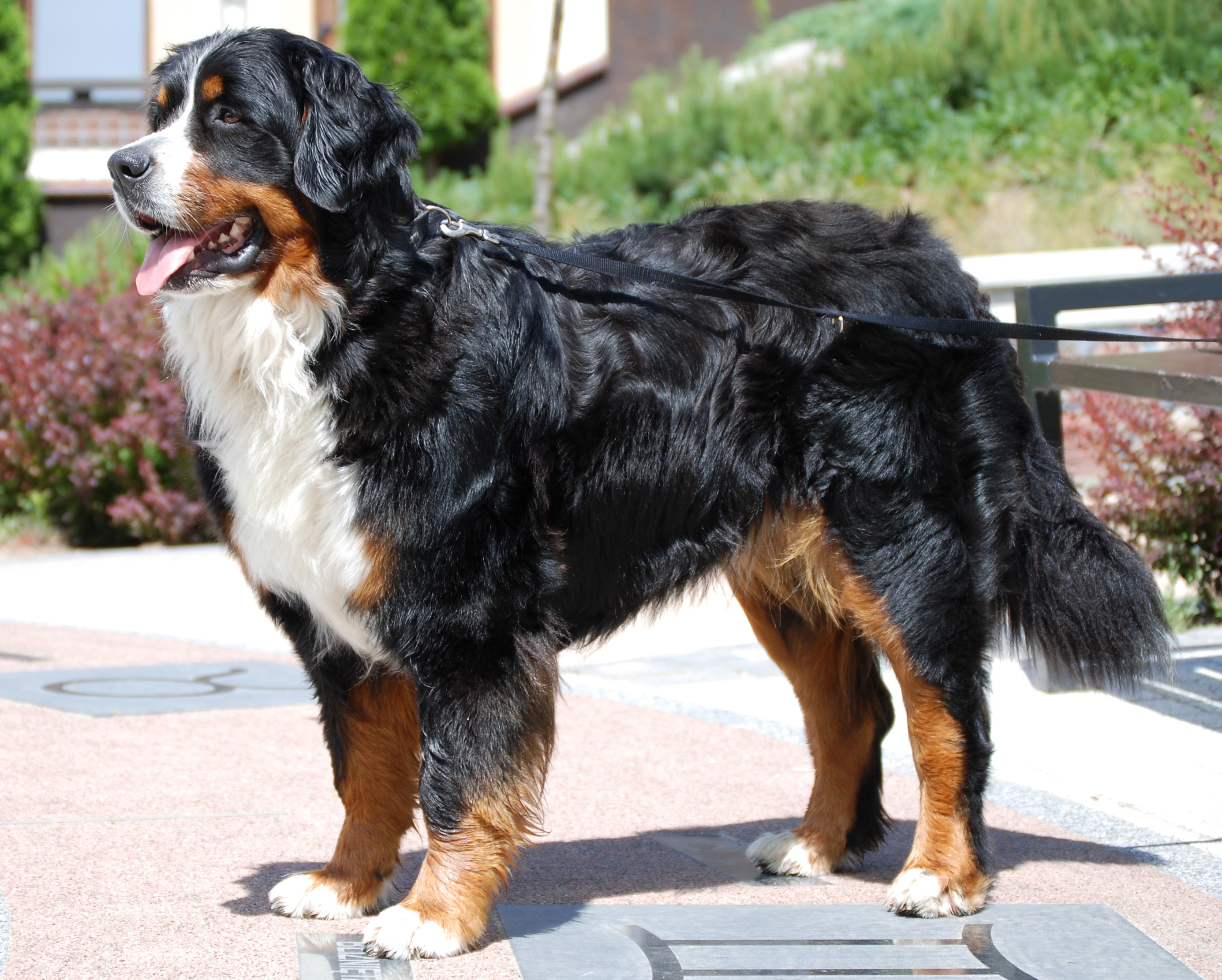
Hip and elbow dysplasia can cause pain and lameness due to abnormal joint development. Thankfully, it can be corrected with medication or surgery if necessary.
Bernedoodles also inherit a higher risk of developing cancer from their Bernese Mountain Dog parent. This is why the average life expectancy of the parent breed is only 7 years.
The risk of cancer decreases with the size of the pup, so Toy Bernedoodles have the lowest cancer risk and highest life expectancy.
Some other health issues that can affect Bernedoodles include skin problems like hot spots, which are caused by excessive licking or chewing of an area. This can be due to their thick coats, so regular grooming is essential.
Here's a list of potential health concerns for Bernedoodles:
- Hip Dysplasia
- Elbow Dysplasia
- Progressive Retinal Atrophy (PRA)
- Von Willebrand’s Disease
- Skin Issues
- Epilepsy
- Hypothyroidism
- Gastric Dilatation-Volvulus (Bloat)
- Patellar Luxation
- Addison’s Disease
- Cushing’s Disease
- Heart Issues
Regular veterinary check-ups and a healthy lifestyle can help prevent or manage these health issues.
Exercise and Training
Training your Bernese Mountain Dog Poodle mix requires patience and time. Early socialization is key to raising a happy and confident pup.
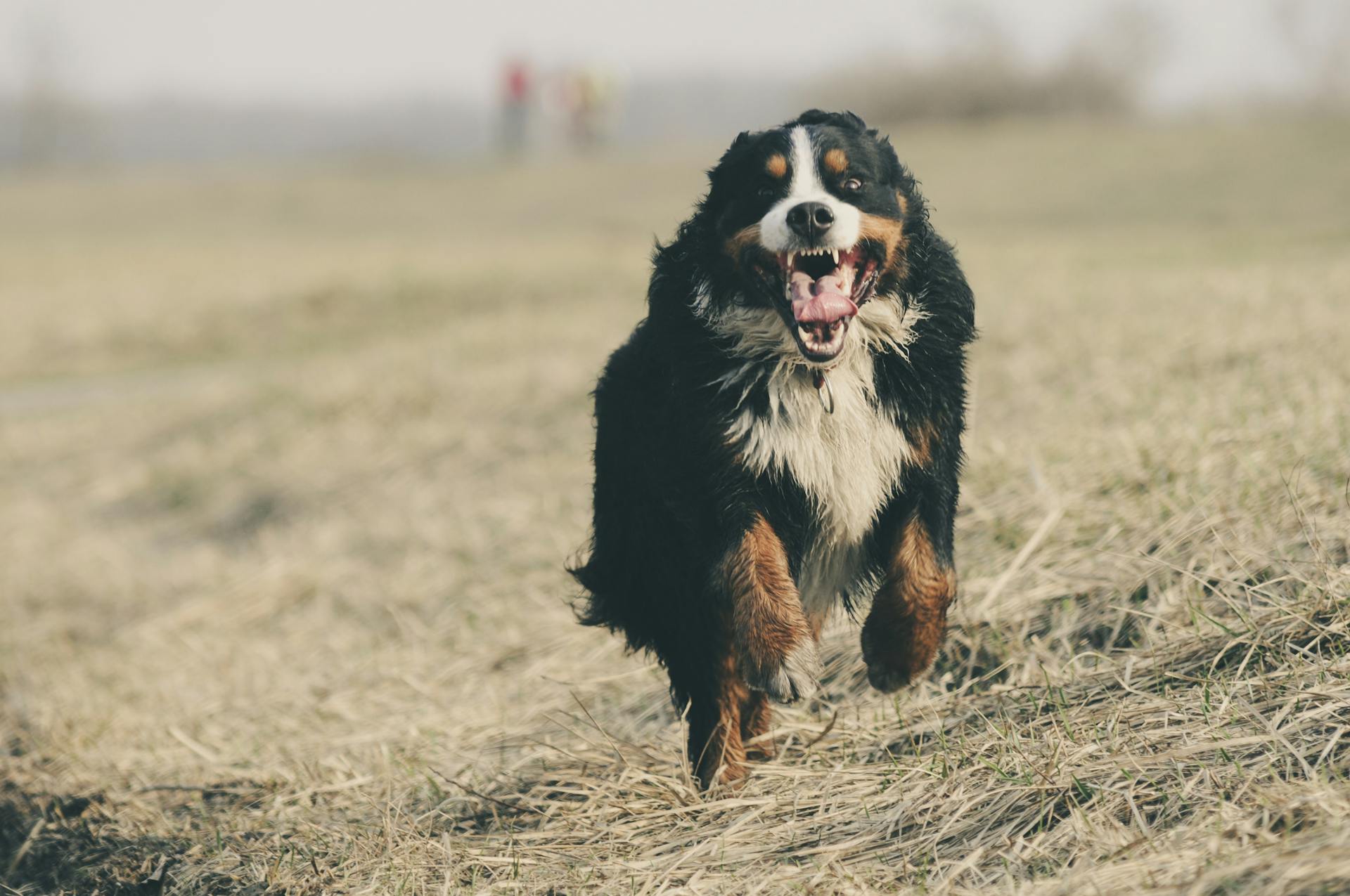
You'll need to put in the work to overcome their potential stubborn streaks. Sessions should be positive and reward-based to promote a safe learning environment.
Rewarding good behavior with verbal and physical praise can go a long way. Redirect your Bernedoodle instead of punishing them when they do something wrong.
Exercise needs can vary greatly depending on which parent breed your mix takes after. Some may need plenty of exercise, while others might be content with shorter periods throughout the day.
Be cautious not to overexert growing bones and joints by exercising in short sessions several times a day. If your Bernedoodle inherits the thick coat of the Bernese Mountain Dog, they may struggle in hot weather.
Exercising early morning or late evening when the sun is cooler can be necessary for their comfort. Training should always be positive and reward-based to avoid stressing them out.
Take a look at this: How Much Exercise Does a Bernese Mountain Dog Need
Family and Living
Bernedoodles are perfect family dogs if they're sourced from a reliable breeder and well-trained from puppyhood.
They'll make fabulous family dogs and be a total joy to own, getting on with everyone. Almost the perfect dog!
Personal space is not part of their vocabulary, so they shouldn't be left alone much; loneliness can result in separation anxiety leading to nervous habits like whining or chewing.
For more insights, see: Bernese Mountain Dog Family
Children and Other Pets at Home
Having children at home can be a blessing for Bernedoodle families, but it's essential to teach kids how to properly treat animals, especially with Tiny and Miniature Bernedoodles that may get injured more easily.
With patience and guidance, your Bernedoodle will become an integral part of the family, loving to play and spending quality time with everyone. They'll be a joy to own!
Bernedoodles generally do well with other dogs if socialization starts early and continues throughout their lives. This is crucial for introducing new animals into the household.
They adore being around their families and will get along famously with kids who treat them gently and respectfully.
Check this out: Bernedoodle vs Bernese Mountain Dog
Living Needs
Bernedoodles thrive on attention and interaction - they're not comfortable with being left alone for long periods.
They need regular exercise to stay happy and healthy, which can include activities like hiking, swimming, and running.
Personal space is not a part of their vocabulary, so be prepared for lots of snuggling and affection.
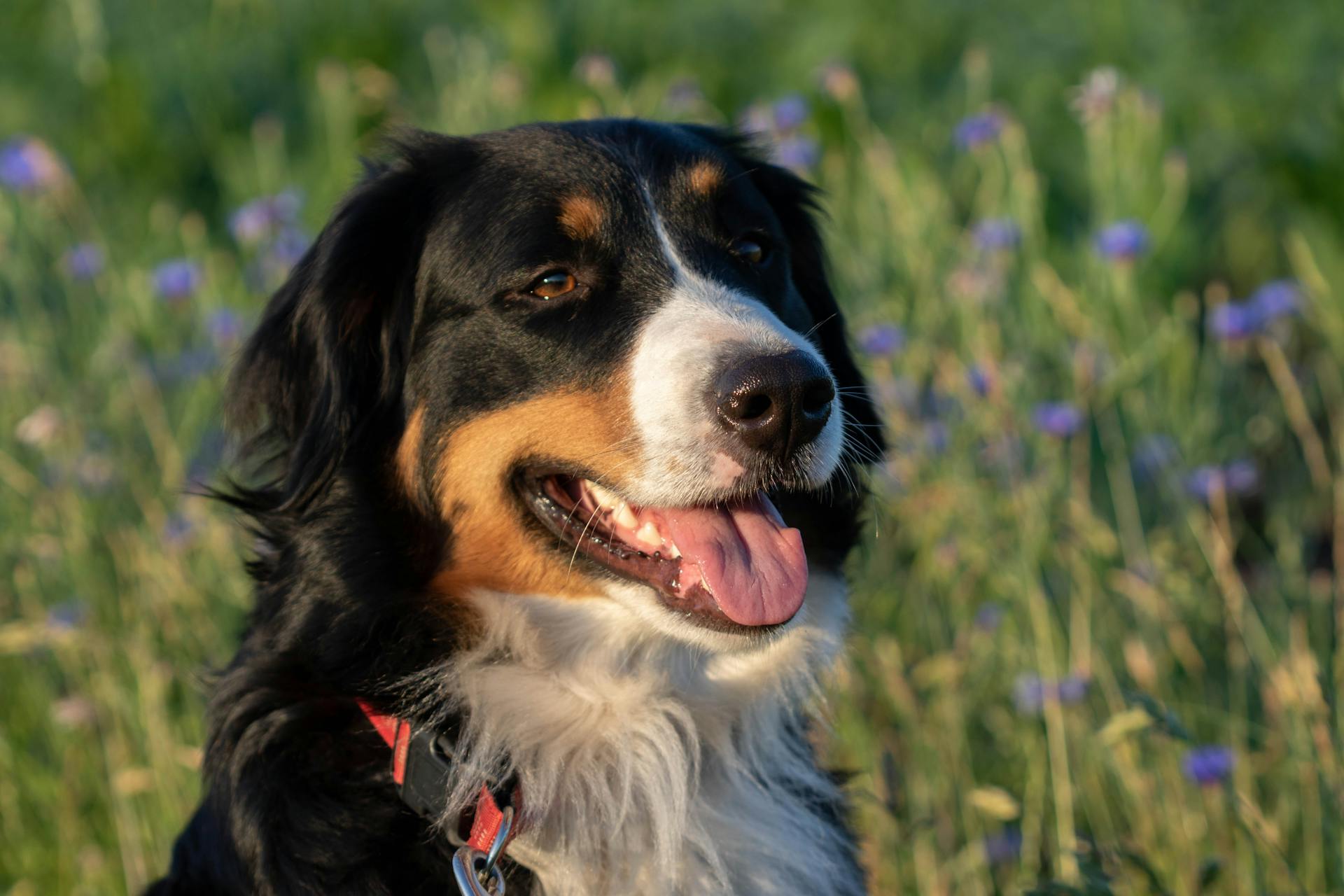
To prevent separation anxiety and nervous habits like whining or chewing, give them plenty of TLC and work to do.
This can include going for walks, agility trials, or even placing a backpack on their back to mimic a job.
Mini- or tiny-size Bernedoodles can live in apartments as long as they get frequent outdoor time and lots of attention.
They're especially gentle-natured and love children, making them a great addition to many families.
In general, Bernedoodles bark infrequently and are more likely to befriend an intruder than scare them away.
Rescue Groups
If you're considering bringing a Bernedoodle into your family, but aren't ready for the long-term commitment, consider reaching out to local rescue groups.
They often have adult dogs available for adoption that are already house-trained and may even be crate-trained.
Please search your local area for Bernedoodle up for adoption.
Readers also liked: Irish Wolf Hound Rescue
Frequently Asked Questions
Why are Bernedoodles so expensive?
Bernedoodles are expensive due to the time and effort invested in early socialization and environmental enrichment by reputable breeders. This investment contributes to their well-rounded temperament and adaptability.
How much money is a Bernedoodle?
A Bernedoodle's cost ranges from $1,500 to $5,000 when purchased from a breeder. Adoption or rescue options can be significantly cheaper, typically between $50-$300.
Are Bernedoodles cuddly?
Yes, Bernedoodles are highly affectionate and love being around their human families, making them perfect cuddle companions. They thrive on attention and regular cuddle sessions, which is why they often excel as therapy dogs.
How big do Bernese mountain doodles get?
Bernese Mountain Doodles typically grow to be 23-29 inches tall and weigh between 75+ pounds. They come in a Standard size that's the largest among Bernedoodle varieties.
What is the life expectancy of a Bernedoodle?
A Bernedoodle's average lifespan is 12-18 years. While they may inherit some health risks from their parent breeds, their overall life expectancy can be longer than that of a purebred Bernese Mountain Dog.
Sources
- https://www.alphapaw.com/dog-breeds/bernese-mountain-dog-mix/
- https://petventuresbook.com/blogs/blog/bernedoodle-breed-guide-key-facts-about-the-bernese-mountain-dog-poodle-mix
- https://dogtime.com/dog-breeds/bernedoodle
- https://www.dailypaws.com/dogs-puppies/dog-breeds/bernedoodle
- https://www.purina.co.uk/find-a-pet/dog-breeds/bernedoodle
Featured Images: pexels.com


